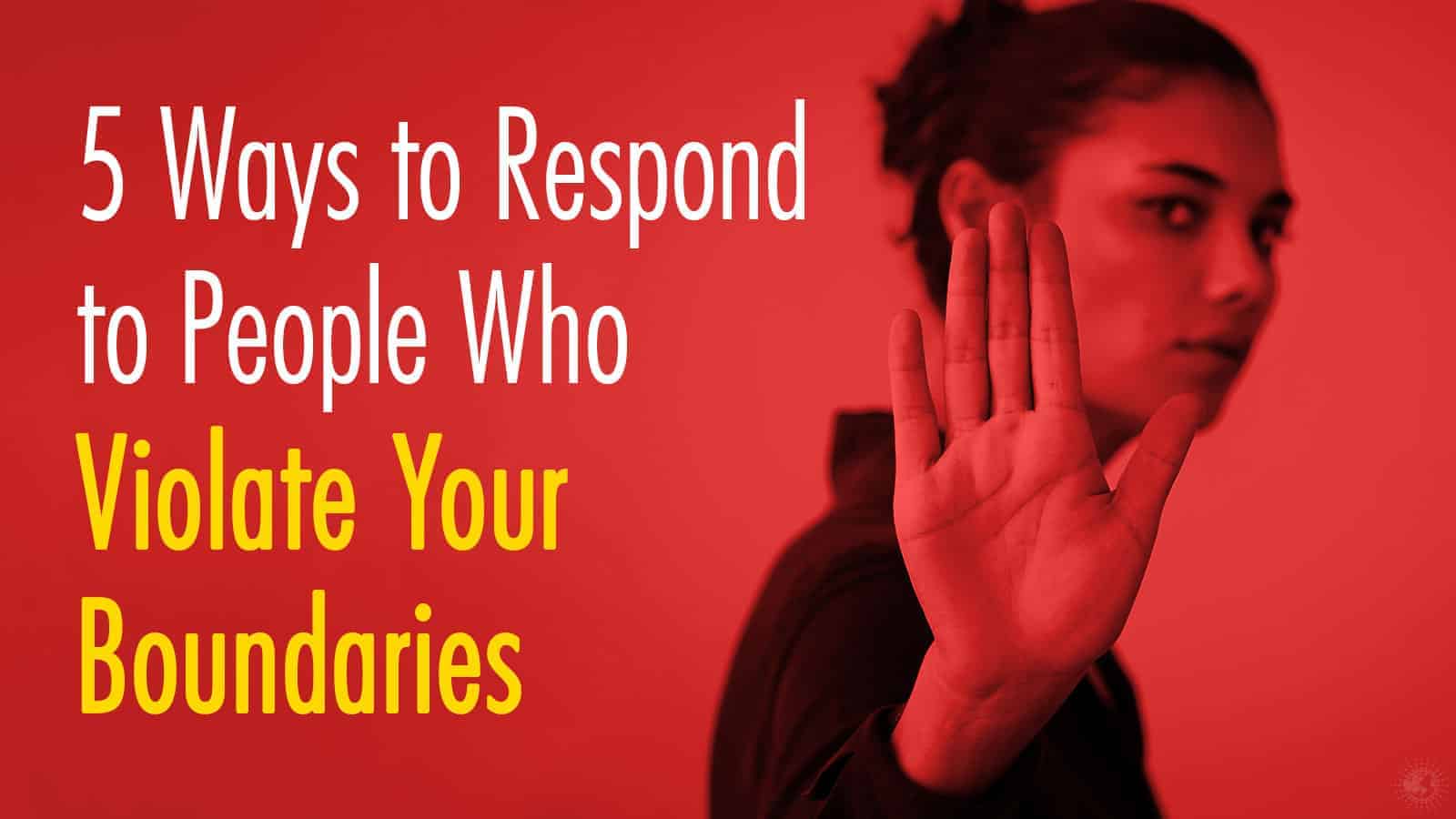Settings boundaries is crucial, but it can be difficult to keep healthy and positive boundaries up when others violate them. It’s incredibly frustrating to draw lines, only to have them crossed again and again.
Most people do not intentionally violate boundaries. They do so out of ignorance, lack of critical thought, or because that’s their go-to strategy for building any kind of relationship with someone.
Still, regardless of good or bad intent, your boundaries have still been violated. And no matter how many times you try to protect them, they are just invaded once again. It’s a very uncomfortable and unpleasant feeling to see the lines you clearly indicate blatantly stepped over.
The trick to preventing this lies in learning how to deal with people who just can’t respect your boundaries. Simply allowing it to keep on happening is not the way to go! Here are some ways to respond to people who violate your boundaries.
5 Ways To Respond To People Who Violate Your Boundaries
1. Make Your Boundaries Extra Clear (To Yourself And To Others)
It is possible that some boundaries you are setting are not consistent or clear, leading to confusion or making them appear less like boundaries and more like suggestions. You may feel too tired to enforce your boundaries one day and let them slip, allowing others to perceive that you are okay with whatever is going on.
You need to have a very good idea of where your boundaries are. When they are already being crossed, causing discomfort, it makes sense that you’d have trouble articulating them or making sense of them. As such, it’s important that you take some time to yourself to contemplate exactly what your boundaries are.
Why is this so important? In the event that someone crosses a line and you need to explain your boundaries to them, you want to be able to explain them in a foolproof, loophole-free manner that is consistent and accurate. When someone violates them, you’ll be able to calmly and quickly inform them where those boundaries are.
Not sure how to figure out where your real boundaries lie? You have to be honest with yourself, but that’s easier said than done. Here are some tips for positive action:
- Give yourself permission to have boundaries and recognize that you deserve to have them.
- Start small and work your way up.
- Discuss them with a trusted friend, family member, or therapist.
- Pay attention to your emotions and feelings.
- Learn self-awareness and self-honesty.
- Consider your past experiences.
Have trouble sticking to your boundaries? You can:
- Write them down so you remember them.
- Have a close, trusted person hold you accountable until you do so naturally.
- Turn them into affirmations and repeat them to yourself daily.
Boundaries must be clearly articulated in order to respond to a person who is violating them. Without clear knowledge on where those boundaries are, you’re setting yourself up for inconsistency.
2. You’re In Charge Here – Act Like It
This is your life, and these are your boundaries. You are the only person who is going to be affected by a lack of respect for them. This means you have the final say. Don’t allow anyone to boss you around when it comes to your boundaries.
This is crucial, as some less well-intentioned people may use manipulative tactics to get around your boundaries, especially when you start standing up for yourself. For example, they may use phrases like:
- You’re just overreacting.
- Calm down!
- It was just a joke.
- I obviously didn’t mean it that way.
- You’re a little too sensitive, don’t you think?
- You’re being unreasonable.
- I didn’t know about it, so it’s not my fault.
- Can’t you make an exception for me?
- Aw, I thought we were close friends!
- You need to lighten up.
- Where’s your sense of humor?
Don’t allow these phrases to throw you off or make you soften up. Even unintentional manipulation is still manipulation, and you shouldn’t be made to feel guilty for having boundaries. There are plenty of ways you can go about correcting these negative people in your life, but it’s important that you do correct them.
Don’t back down, even if told to “calm down,” or any other phrase. You have the right to declare your values, so tell them that your boundaries are not on the table for discussion. It’s simple: no means no, no matter what.
Do note, though, that you do not have to be hurtful in order to be strict. Set boundaries and correct others firmly, but gently and kindly, too – especially for first-time “offenders.” Do not resort to personal insults like:
- You’re just the type of person who tends to cause people to feel uncomfortable.
- I don’t understand how this is so difficult for you to get.
- You must be pretty dull if you haven’t understood me by now.
- I’m getting sick of telling you about this.
- You’re such an invasive person.
You should also be very clear and avoid using wishy-washy words, like:
- Perhaps
- Maybe
- Probably
- Sometimes
- Possibly
Instead, use “I” statements that articulate feelings instead of pass blame, such as:
- I feel uncomfortable when you stand so close.
- I feel like you aren’t respecting the boundaries I’ve talked about.
- When you say things like that, I feel very uncomfortable.
This is sure to get a more positive response.
3. Record Violations For Further Adjustment
When someone continues to cross lines again and again, it’s time to collect evidence. Use a journal or document to take note of the dates, times, and natures of boundary disrespect. It is also helpful to record the replies that you provided to them in this respect.
This will not only allow you to prove someone’s negative track record, but it will also allow you to take an objective look at how you handle these situations, too. Are you not being clear or firm enough? Are your boundaries inconsistent? Do you tend to react very angrily, leading to more trouble down the line?
This can also help you to take a look back at someone’s actions and consider them carefully. You may learn more about yourself and the other person through this practice.
4. Accept That Not Everyone Will Respect Your Boundaries
We always hope for the best of people, but for some, that just doesn’t work. There are people who will never listen to you, and will never take you seriously, and they will continue to overstep boundaries for as long as you have interactions with them. In these cases, your response has to be different – don’t invest too much energy into correcting them.
You cannot change the minds of these people. They may be toxic or just plain ignorant – either way, it’s not pleasant. Consider why they may be behaving this way and, based on critical thought, decide how you can best respond to their repeated annoying violations.
It can take a lot of positive thinking to get your mind on the right track in order to ignore someone who continually violates your boundaries, but there is a lot of wisdom in not giving them the satisfaction of engagement. Instead of reacting angrily or in a way that shows you are upset, you can:
- Laugh it off
- Make a joke about it
- Ignore them completely
- Smile and pretend not to care
Essentially, just don’t show them that they’re getting to you. It causes a great power shift, and your lack of reaction will make the process of goading you less fun for them. Often, this can cause the behavior to stop.
Do note that this does not apply the same way to someone who is hurting you physically; lodge a formal complaint, speak to a higher-up at work, or contact the police in these cases, depending on the situation.
5. Cut Out Those Who Don’t Listen
Unfortunately, there may come a point when you realize that someone is a lost cause. If it’s a friend or family member – basically someone you can avoid, unlike a colleague at work or someone you have to see often – then it’s time to call it quits with them. It’s a tough choice, so here are some questions to consider.
- What is the nature of your relationship? Is there a purpose to the relationship, whatever kind it is? Is it healthy? Would it be easy to cut them off, or is this their one flaw while they provide kindness and support in other ways?
- What harm is the relationship causing you? Are you losing focus, becoming anxious or unhappy, or do you feel like you are being abused? Or does it not really bother you at all?
- Will burning bridges make things more difficult in the long run? Will it be a decision that haunts you, lands you in trouble, or causes you to lose other relationships?
- How easily can you cut things off? If it’s a colleague, can you request a work transfer? If it’s a family member, are you dependent on them in any way, and who’s side is the rest of your family on? Is it a housemate, and if so, can you move out quickly? If it’s a friend, will your other friends likely try to convince you to rethink?
It can be a difficult decision to make, but with positive thinking and confidence, you can and should make a choice that is most helpful to you. At the end of the day, you have multiple options to choose from when it comes to distancing yourself from someone who won’t stop violating your boundaries. You do not need permission or approval in order to do what’s best for you.
Final Thoughts On Some Ways To Respond To People Who Violate Your Boundaries
Boundary-breakers come in all forms. They can be family members, friends, and colleagues. They can be toxic, manipulative, or actually have good intentions. But no matter who violates your boundaries and why, it’s important to keep in mind that your boundaries are valid and you deserve for them to be respected.
Setting boundaries can be difficult, and reinforcing them against those who break them is even harder. There is no easy answer, and solutions to this problem aren’t one-size-fits-all. You have to determine the cause for these boundary violations and figure out the best solutions to them.
Some people get angry. Others feel offended. Even more, they might seem upset. But the people who matter will apologize, listen, and learn. Remember, you deserve respect. Your boundaries (and those of others) should be heeded and abided by, and it is not okay to walk all over them!


















